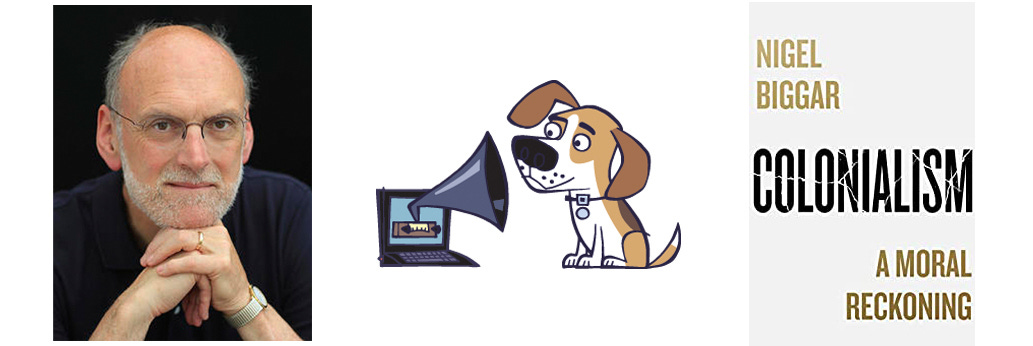Nigel Biggar is an Anglican priest, academic and writer. Formerly the Regius Professor of Moral and Pastoral Theology at Oxford, he now directs the McDonald Centre for Theology, Ethics & Public Life and chairs the board of the UK’s Free Speech Union. The author of many books on ethics, his new controversial one is Colonialism: A Moral Reckoning.
You can listen to the episode right away in the audio player above (or on the right side of the player, click “Listen On” to add the Dishcast feed to your favorite podcast app — though Spotify sadly doesn’t accept the paid feed). For two clips of our convo — debating what makes an empire worse than others, and whether the British started or just exploited the wars in their colonies — pop over to our YouTube page.
Other topics: writing his book as a response to revisionism; the 1619 Project; the difficulty he had getting it published; the various motives of British colonialism and its slow development; how anti-slavery stemmed from the Enlightenment and Christianity; the colonists who fled poverty and religious persecution; the Irish Famine; the contempt and fear and racism toward native peoples; the natives who welcomed trade and protection; whether plagues were intentional or unavoidable; non-European empires and human sacrifice; the ubiquity of slavery throughout history; the unique evil of the transatlantic trade; maroons who kept slaves of their own; Zionism; the colonists who prized foreign cultures; the hypocrisy of British subjects in America exploiting natives; the Indian MP in the 1890s; Indians fighting alongside the British in WWII; the decolonized who embraced the liberal institutions of the Brits; the Chinese who fled communism for the colony of Hong Kong; the diversity of Boris’ cabinet; and the historic triumph of Rishi Sunak.
Browse the Dishcast archive for another discussion you might enjoy (the first 102 episodes are free in their entirety — subscribe to get everything else). Coming up: Tabia Lee on her firing as a DEI director, Chris Stirewalt on Fox and the MSM, Ben Smith on going viral, John Oberg on veganism, and Patrick Deneen on a post-liberal future. Send your guest recs and pod comments to dish@andrewsullivan.com.
Here’s a listener on last week’s episode with Mark Lilla about unplugging from online politics:
Another delightful and enchanting conversation — thank you! I listened to it while walking near the lake and realized that by listening to podcasts, I am not fully immersed in the environment, not enjoying the silence. Your conversation was very engaging and it felt like I was part of it, but in reality I was just a remote listener of pre-recorded dialogue — a dialogue on living your own life, enjoying being somewhere, and not being distracted by noise and the urge to record what’s happening. How ironic. :-)
Another listener also stopped to smell the little things (to quote Dina Martina):
I listened to the episode during a photography session in London and decided to follow your advice of letting the moment happen. I eventually came into Postman’s Park and took this picture as soon as I saw the robin (and I also spent time watching it just through my eyes):
Life is full of surprises if you look the right way. It was powerful to hear important truths be expressed in your conversation with Mark Lilla.
This next listener enjoyed the erudition of Mark and other guests:
I’ve been reading the Dish for several years, but the podcast has been a revelation. At 82, with an Ivy League undergraduate and law education, following humble circumstances, I find myself getting from you and your guests a weekly dose of philosophy, which I never studied but now find most useful while late in my “game.” Surprise surprise! I find I have blundered into a lifetime of thoughts and attitudes that might have come more readily, and deeply, had I read the classics earlier or had any kind of religious training as a youth.
I found your conversation with Mark Lilla especially stimulating and enlightening. Keep it up and God bless!
That made my day. Another adds:
You seem genuinely surprised to have a podcast audience who loves not being condescended to. Even if we don’t grasp all the academic concepts as you and your guests understand them, you believe we will come up to meet your challenge. That is what I’m thanking you for today. Your mission to treat us as equals and with respect, especially with your erudition and background that could so easily go the other way, is so rare. Please keep up this mission.
I shouldn’t be surprised by now. The Dish readership is a privilege and a treasure. This next listener questions the premise of our chat about literature:
You say that novel-reading has plummeted, but what do you make of this Guardian piece on the “UK publishing industry reporting record-breaking year in 2022”?
Fiction was up by 9% to £797m of sales, and children’s books were up by 1%. Non-fiction saw a decrease of 2%, but still accounted for £1bn.
So if this isn’t the case in the UK, is the US that far behind?
That trend in the UK does seem to mirror the US: “Adult fiction was the only one of the major categories to have a sales increase last year over 2021, with print unit sales up 8.5%.” But I meant compared with, say, the 1990s, let alone the 1960s.
A book recommendation:
If you like sci fi with a touch of gravitas, I would check out The Peacemaker’s Code by Deepak Malhotra. Apart from bringing to bear a good deal of expertise from the world of internal negotiations, some of the prose really is quite remarkable considering the genre (and only the tiniest irksome segment romanticising a return to primitive living).
Any reverse recommendations are more than welcome. I have a nonfiction reading list as long as my arm, but find it difficult to locate decent fiction, given the reviewers. Anything along the lines of Hilary Mantel would be ideal.
Another has a guest recommendation:
Yuval Levin is one of the more thoughtful commentators on American politics. I think about this congressional testimony quite often, on “Building a More Civil and Collaborative Culture in Congress.” I think Yuval is spot on in his diagnosis of the reason for the decline in the public opinion of Congress.
Agreed. He’s always been possessed of a first-class mind, and I’ve learned a lot from him. One more rec:
Michael Massing, author of Fatal Discord: Erasmus, Luther and the Fight for the Western Mind, would be a terrific guest. Here’s an article he wrote for NYRB, as well as reviews in the NYT and Financial Times. Humanism, liberal democracy, the evangelical movement, authoritarian fervor — are all themes you and your guests have delved into recently.
In many emails below, readers continue to vigorously dissent over my column encouraging Tucker to join the race with RFK Jr. First up:
You predict a Carlson candidacy would “rattle elites,” “force a rethink” on the left and the right, and “break up the Trump-Biden dynamic.” My goodness, Andrew!
Listen to this episode with a 7-day free trial
Subscribe to The Weekly Dish to listen to this post and get 7 days of free access to the full post archives.














